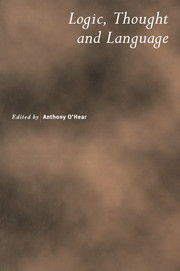Book contents
- Frontmatter
- Contents
- Preface
- Notes on Contributors
- What logic should we think with?
- Mental Representation and Mental Presentation
- Self-knowledge, Normativity, and Construction
- The Normativity of Meaning
- Two Theories of Names
- Relativism and Classical Logic
- Principles for Possibilia
- What are these Familiar Words Doing Here?
- Particular Thoughts & Singular Thought
- Conditional Belief and the Ramsey Test
- Necessary Existents
- Ambiguity and Belief
- Basic Logical Knowledge
- Frege's Target
- Index
Basic Logical Knowledge
Published online by Cambridge University Press: 05 October 2010
- Frontmatter
- Contents
- Preface
- Notes on Contributors
- What logic should we think with?
- Mental Representation and Mental Presentation
- Self-knowledge, Normativity, and Construction
- The Normativity of Meaning
- Two Theories of Names
- Relativism and Classical Logic
- Principles for Possibilia
- What are these Familiar Words Doing Here?
- Particular Thoughts & Singular Thought
- Conditional Belief and the Ramsey Test
- Necessary Existents
- Ambiguity and Belief
- Basic Logical Knowledge
- Frege's Target
- Index
Summary
At least some of us, at least some of the time—when not in the grip of radical sceptical doubt—are inclined to believe that we know, for example, that if we infer a conclusion from two true premises, one a conditional whose consequent is that conclusion and the other the antecedent of that conditional, then our conclusion must be true, or that we know similar things about other simple patterns of inference. If we do indeed have knowledge of this sort, it is what I mean by logical knowledge. Logical knowledge is, roughly speaking, knowledge about logic—such as knowledge that a certain principle of inference necessarily preserves truth, or that every proposition of a certain form must be true—and so is not the same thing as knowledge that is gained by using logic, i.e. inferential knowledge. That is not to say, of course, that logical knowledge can't be inferential. On the contrary, it is barely open to question that—if there is any logical knowledge at all—there is a lot of inferential logical knowledge.
For example, if we know that the introduction and elimination principles for the conditional are truth-preserving, we can surely get to know, by inference, that the principle of hypothetical syllogism (i.e. transitivity of the conditional) is so too, not to mention other, less obvious and more recondite, examples of putative logical knowledge.
- Type
- Chapter
- Information
- Logic, Thought and Language , pp. 279 - 304Publisher: Cambridge University PressPrint publication year: 2002
- 1
- Cited by



